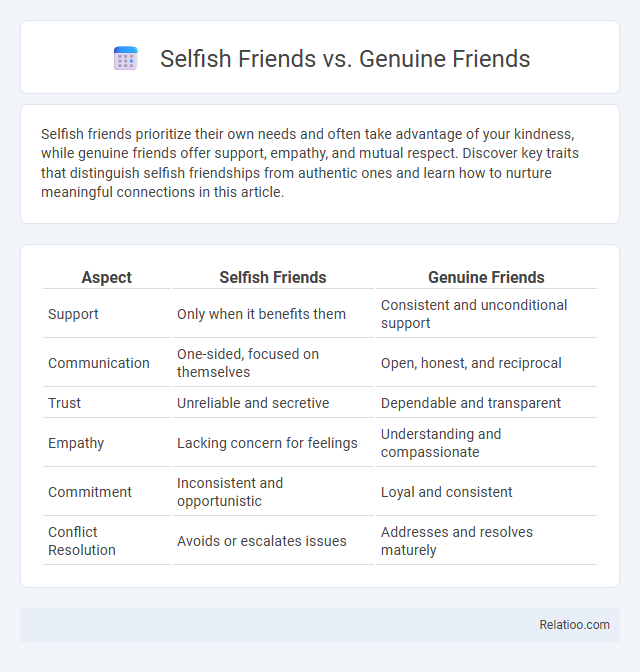Selfish friends prioritize their own needs and often take advantage of your kindness, while genuine friends offer support, empathy, and mutual respect. Discover key traits that distinguish selfish friendships from authentic ones and learn how to nurture meaningful connections in this article.
Table of Comparison
| Aspect | Selfish Friends | Genuine Friends |
|---|---|---|
| Support | Only when it benefits them | Consistent and unconditional support |
| Communication | One-sided, focused on themselves | Open, honest, and reciprocal |
| Trust | Unreliable and secretive | Dependable and transparent |
| Empathy | Lacking concern for feelings | Understanding and compassionate |
| Commitment | Inconsistent and opportunistic | Loyal and consistent |
| Conflict Resolution | Avoids or escalates issues | Addresses and resolves maturely |
Understanding Selfish Friends: Key Traits
Selfish friends often prioritize their own needs and desires, showing limited empathy or consideration for your feelings, which contrasts sharply with genuine friends who demonstrate consistent support and mutual respect. Key traits of selfish friends include a lack of reciprocity, frequent manipulation, and an unwillingness to compromise, which can lead to emotional exhaustion in relationships. Recognizing these behaviors helps you protect your well-being and nurture connections that are authentic and mutually beneficial.
Genuine Friends: What Sets Them Apart
Genuine friends stand out by offering consistent support, honesty, and empathy, prioritizing your well-being over their own interests. Unlike selfish friends who seek personal gain and validation, genuine friends invest time and effort to build trust and understanding. Your emotional growth thrives in the presence of true friendship, highlighting the importance of recognizing and valuing these meaningful connections.
The Impact of Selfish Friends on Your Well-being
Selfish friends often prioritize their own needs and desires, leading to emotional drain and diminished trust in relationships. Genuine friends, by contrast, offer mutual support, empathy, and care that enhance your well-being and foster a sense of security. The presence of selfishness in friendships can increase stress, reduce self-esteem, and negatively affect your mental health.
Emotional Support: Real vs. Self-Serving Friendship
Emotional support provided by genuine friends is consistent, empathetic, and prioritizes your well-being, fostering trust and mutual growth. Selfish friends often offer support only when it benefits them, making their actions conditional and unreliable. Recognizing these differences helps you nurture meaningful connections while avoiding self-serving relationships that lack authentic emotional investment.
Red Flags: How to Spot a Selfish Friend
Selfish friends often prioritize their own needs, consistently seeking attention or favors without reciprocation, which serves as a key red flag signaling an imbalanced relationship. Genuine friends demonstrate empathy, mutual support, and respect, fostering trust and emotional security. Recognizing selfishness involves observing patterns of manipulation, lack of consideration, and one-sided communication that undermine personal boundaries and well-being.
Loyalty and Trust: Genuine Friends Stand the Test
Selfish friends often prioritize their own interests, resulting in inconsistent loyalty and eroded trust over time. Genuine friends demonstrate unwavering loyalty and build deep trust by consistently supporting and valuing others. The contrast between selfishness and genuine friendship is most evident in how trust is cultivated and maintained through reliable, selfless actions.
Communication Styles: Genuine vs. Selfish Friends
Genuine friends communicate with empathy, active listening, and honesty, prioritizing your feelings and mutual understanding. Selfish friends often dominate conversations, showing little interest in your perspective or emotional needs. Your relationships thrive when communication is balanced, transparent, and rooted in respect rather than self-centeredness.
Navigating Conflict: Responses from Each Type of Friend
Selfish friends often respond to conflict with defensiveness and a focus on their own needs, disregarding others' feelings and perspectives. Genuine friends approach conflict with empathy, actively listening and seeking mutual understanding to resolve disagreements constructively. Selfishness in friendships typically escalates tensions, whereas genuine friendship fosters trust and effective communication during conflicts.
Growing Your Circle: Attracting Authentic Relationships
Growing your circle with genuine friends requires recognizing the difference between selfish friends who prioritize their needs and those who offer authentic support and understanding. Selfishness often creates imbalanced relationships that drain your energy, while genuine friends contribute to mutual growth and trust. Focusing on attracting authentic relationships helps you build a supportive network that fosters personal development and emotional well-being.
Choosing Healthier Connections: Moving On from Selfish Friends
Choosing healthier connections involves recognizing selfish friends who prioritize their needs over mutual respect and empathy, leading to emotional exhaustion and imbalance. Genuine friends demonstrate consistent support, active listening, and reciprocal care, fostering growth and trust within the relationship. Moving on from selfish friendships creates space for authentic bonds that enhance mental well-being and personal development.

Infographic: Selfish friends vs Genuine friends
 relatioo.com
relatioo.com